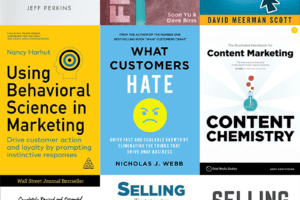Episode 55 of Yes, and Marketing
As host of The Marketing Book podcast, Douglas Burdett has read more than 300 marketing books and has interviewed an author every week for the last six years. In his conversation with Steve, he shares a few of the most important lessons he’s read and offers book recommendations for different marketing situations, in addition to revealing the three books every marketer should read.
Skip through the chapters in the audio above to hear his key takeaways or read on for his list of top books.
Guest-at-a-Glance
???? Name: Douglas Burdett
???? What he does: Host of The Marketing Book Podcast. Founder of marketing agency Artillery.
????️ Find Douglas on the web: Artillery | The Marketing Book Podcast | LinkedIn | Twitter
???? Get smart: “Marketing has gone from plastic surgery to internal medicine.”
Book Recommendations
???? 12 Powers of a Marketing Leader by Thomas Barta and Patrick Barwise
Doug says: “Barta was a McKinsey partner and Barwise is a marketing professor in London. What they did is they analyzed an incredible amount of data, surveys, research about perceptions of marketers, and they then studied what the most successful marketers are doing now. So they show you the 12 powers—the 12 things that really successful marketers are doing now—which is gonna be different from the days of Don Draper.”
Hear more: Doug’s interview with Thomas
???? Marketing Flexology by Engelina Jaspers
Doug says: “She’d worked for a lot of big corporations around the world as a marketer. And she looked at what the most successful marketers had in common, as well as the ones who were not successful. And [the most successful] would have a company first mindset. She jokes that if you’re a marketer and you don’t have a company first mindset—it’s hard to build a marketing career working for an insolvent company.”
Hear more: Doug’s interview with Engelina
???? Stand-Out Marketing by Stacey Danheiser, Simon Kelly and Paul Johnston
Doug says: “The first half of the book talked about why there’s such a sea of sameness in the corporate world. They explain why there’s such a lack of differentiation, and it was just fascinating. And then the second half of the book showed what you—as a marketer or a senior sales person—the qualities you need to have to help your organization better differentiate yourself to your customers.”
Hear more: Doug’s interview with Stacey
???? Buyer Personas by Adele Revella
Doug says: “It’s still one of my favorites. …It really helps us give our clients an unfair advantage. You just do a 20 or 30 minute interview with a customer who represents the type of customer that client wants more of. And you try to just discern these five insights. And it really, really works well.”
Hear more: Doug’s interview with Adele
???? The Experience Economy by Joseph Pine and James Gilmore
Hear more: Doug’s interview with James
Doug says: “Before the Industrial Revolution, there were commodities. And then there were finished goods. And then for at least a hundred years, there was a service economy. But [Pine and Gilmore] laid out pretty clearly that we’re actually in an “experience economy” now, where people will skimp on products or services in order to have a better experience.”
???? UnBranding by Alison and Scott Stratten
Doug says: “One of the big insights from the book was that the most important branding department in your company is not marketing, it’s human resources. It’s all about the kind of people that you can attract to work for you and take care of your customers—how you treat them.”
Hear more: Doug’s interview with Alison
???? Sales Differentiation by Lee Salz
Doug says: “He says, ‘Yeah, there are certain things that you can do to differentiate your company—and you should—but the biggest differentiator is how you sell.‘ It was just brilliant.”
Hear more: Doug’s interview with Lee
???? The Expansion Sale by Tim Riesterer
Doug says: “The Expansion Sale is all about the conversations you need to have with existing customers, which is almost the other side of the coin from the conversations you have with a prospect—and yet, most companies have the same kind of communications before and after they become customers.”
Hear more: Doug’s interview with Tim
???? The New Rules of Marketing & PR by David Meerman Scott
Doug says: “[Before starting The Marketing Book Podcast] I stumbled upon David Meerman Scott’s book, The New Rules of Marketing and PR. And it was sort of a revelation. It was one of the two most influential books because the right book at the right time can make a big difference in your career. And I saw where everything was going.”
Hear more: Doug’s interview with David
???? SEO for Growth by John Jantsch and Phil Singleton
Doug says: “It was about 150 pages and it beautifully explained what [SEO] means. If you are paying some company to tinker with your website to ‘improve your search engine rankings,’ you are getting fleeced. If you’re talking to an SEO company and they’re not talking to you about content, you better know what you’re looking for.”
Hear more: Doug’s interview with John
???? The Content Code by Mark Schaefer
Doug says: “He saw the content shock was happening, where there was more content being produced every two days than had been produced since beginning of recorded history to the year 2003, according to Eric Schmidt, or something like that. It’s just over-saturation. And up until that point, a lot of people thought when you hit the publish button, it was the finish line. But actually, when you hit the publish button, it’s the starting gun. And he went on to explain all the other things you have to do to get your content going and to amplify it.”
Hear more: Doug’s interview with Mark
???? Perennial Seller by Ryan Holiday
Doug says: “[Ryan] once said in his book Perennial Seller that a lot of people like the idea of being an author, but you’re not an author until you know that you’ll be tortured by something until you get it out in a book.”
Hear more: Doug’s interview with Ryan
Top Quotes
????️ Doug:
“I started the podcast that I would have wanted to listen to.”
“Do everything you can to connect what you are doing as a marketer, with revenue and/or stated company goals.”
“It must be twice as hard to write a short book than a long book.”
“A major blind spot for companies is realizing that they should be selling more to their own customers because those customers already trust them. They probably like you more than you realize. And there’s a lot less risk, and it’s faster revenue.”
“Marketing has gone from plastic surgery to internal medicine.”
“The most important word in marketing sales is empathy. …Empathy is the ability to put yourself in the other person’s shoes, even for a few minutes.”
“When all you’re talking about is yourself and your products, you are really tying one hand behind your back.”



